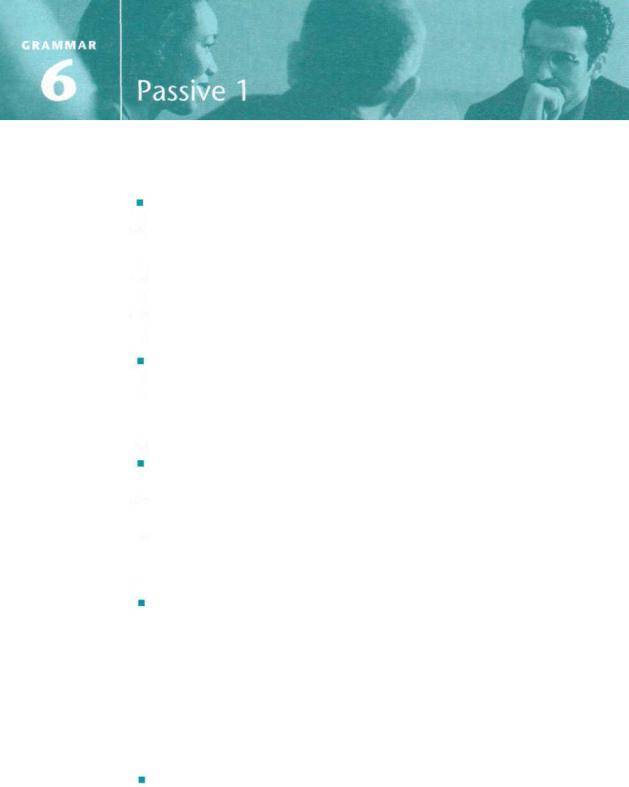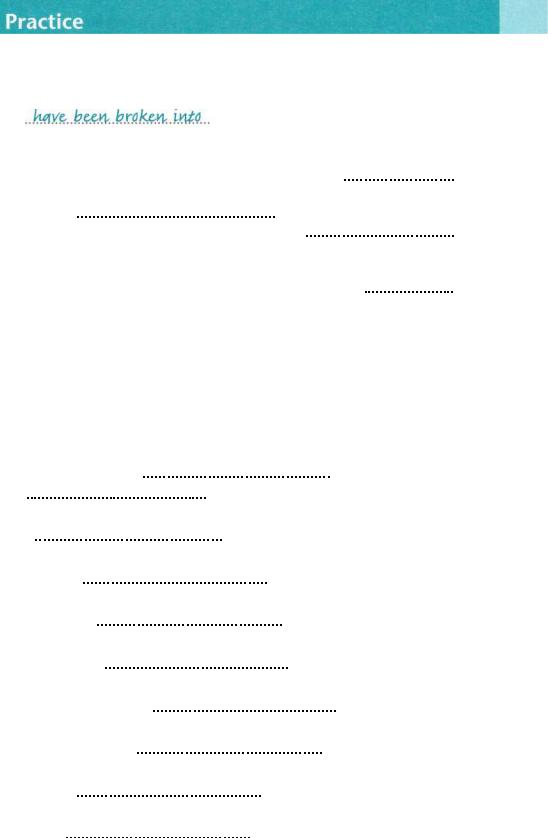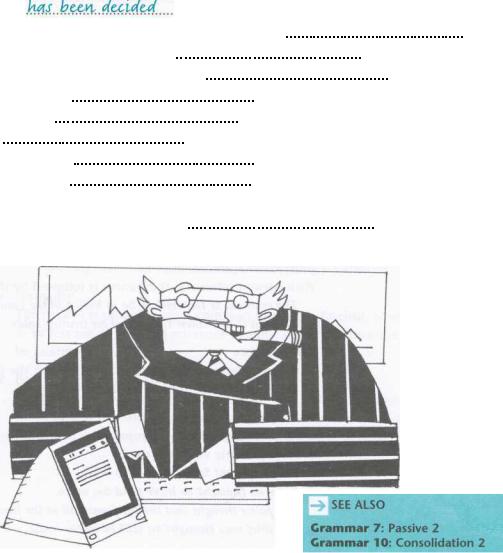
3_Macmillan_-_Advanced_Language_Practise
.pdfA D V A N C ED LANGUAG E PRACTICE
7 Put each verb in brackets into an appropriate verb form.
a) |
Sam hadn't received. |
........ (not/receive) the parcel the last time I |
|
|
.............................................. |
(speak) |
to him. |
b) |
I .............................................. |
(consider) buying a house but now I |
|
|
.............................................. |
(change) my mind. |
|
c) |
When you .............................................. |
|
(feel) hungry, room service |
|
.............................................. |
(bring) you whatever you want. |
|
d) |
I .............................................. |
(find) it difficult to convince the ticket |
|
|
inspector that I .............................................. |
|
(lose) my ticket, but he believed |
|
me in the end. |
|
|
e) |
Ever since I .............................................. |
|
(be) a young child, I |
|
.............................................. |
(die) to meet you. |
|
f) |
As soon as I .............................................. |
|
(have) a look at the designs, I |
|
.............................................. |
(send) them to you. You'll get them by Friday. |
|
g) |
Whatever .............................................. |
|
(happen), I |
|
.............................................. |
(meet) you here in a week's time. |
|
h) By the time you .............................................. |
|
(finish) getting ready, we |
|
|
.............................................. |
(miss) the train! |
|
i) |
Sally! I .............................................. |
|
(not/expect) to see you here! What |
|
.............................................. |
(you/do) |
in New York? |
8 Decide whether each underlined phrase is correct or not. If it's incorrect rewrite the phrase.
a)Will you be seeing Rob Jones tomorrow? I wonder if you could give him a message from Sally Gordon? ..correct...
b)I had a great time in the Greek Islands. We would rent a small boat and go fishing every day. ....................................
c)Julie, hi! I've been hoping I'd see you. I've got some good news! ..................
d)We had a terrible time looking after your dog. It was constantly chasing the cats next door ...................
e)We had a lovely time in Madrid. Every day we were exploring the city, and in the evening we were going to exciting bars .....................................
f)The steam engine is usually thought of as a relatively modern invention, but the Greeks had built a kind of steam engine in ancient times ...................
g)I felt rather worried. It was growing darker and colder, and there was still no sign of the rescue helicopter ...................
h)Don't worry! All we have to do is wait here until someone will find us.
i)This meat is really tasting awful! Are you quite sure it was fresh?
32

|
Explanations |
Basic uses of the |
Agent and instrument |
passive |
The person who performs an action in a passive sentence is called the agent, |
|
introduced by by. The agent may or may not be mentioned. |
|
My purse was found by one of the cleaners. |
|
A new road has been built. |
|
An object which causes something to happen is called an instrument, |
|
introduced by with. |
|
He was hit on the head with a hammer. |
|
Verbs with two objects |
|
Verbs which have two objects can be made passive in two ways. |
|
/ was handed a note. A note was handed to me. |
|
Other common verbs of this type are: |
|
bring, give, lend, pass, pay, promise, sell, send, show, tell |
|
Verbs with object and complement |
|
Some verbs have a noun or adjective which describes their object. |
|
We elected Jim class representative. |
|
Everyone considered him a failure. |
|
When these are made passive, the complement goes directly after the verb. |
|
Jim was elected class representative. |
|
He was considered a failure. |
|
Verbs which can't be passive |
|
Most verbs with an object (transitive verbs) can be made passive: |
|
e.g. drive is transitive because one can drive something (a car). |
|
However, a few transitive verbs may not be used in the passive. These |
|
include: become, fit (be the right size), get, have, lack, let, like, resemble, suit. |
|
Verbs with no object (intransitive) can not be passive: |
|
e.g. fall is intransitive, you cannot 'fall something'. |
|
Therefore it is not possible to say The tree was fallen'. Instead the sentence |
|
must be active: The tree fell. |
Using and not |
Change of focus |
mentioning the |
The passive can change the emphasis of a sentence. |
agent |
Jack won the prize, (focus on Jack) |
|
The prize was won by Jack, (focus on the prize) |
33

A D V A N C ED L A N G U A G E P R A C T I C E
Unknown agent
The agent is not mentioned if unknown.
My wallet has been taken.
In this case, there is no point in adding an agent: 'by somebody'.
Generalised agent
If the subject is 'people in general' or 'you' the agent is not mentioned.
Bicycles are widely used in the city instead ofpublic transport.
Obvious agent
If the agent is obvious or has already been referred to, it is not mentioned.
Linda has been arrested! (we assume by the police)
The company agreed to our request and a new car park was opened.
Unimportant agent
If the agent is not important to the meaning of the sentence it is not mentioned.
/ was advised to obtain a visa in advance.
 Impersonality
Impersonality
Using the passive is a way of avoiding the naming of a specific person who is responsible for an action.
It has been decided to reduce all salaries by 10%.
In descriptions of processes, there is emphasis on the actions performed rather than on the people who perform them.
Then the packets are packed into boxes of twenty-four.
34

G R A M M A R 6 PASSIV E 1
Correct any verb forms which are impossible or inappropriate.
a)A lot of homes in the area have been being broken into by burglars.
b)As I drove south, I could see that the old road was rebuilding.
c)I suppose the letter will have been delivered by now
d)There is nothing more annoying than been interrupted when you are speaking
e)Jim was been given the sack from his new job
f)Somehow without my noticing my wallet had been disappeared.
g)The new shopping centre was opened by the local MR
h)A lot of meetings have been held, but nothing has being decided yet.
2Both sentences in each pair have the same meaning. Complete the second sentence.
a)The crowd was slowly filling the huge stadium.
The huge stadium  by the crowd.
by the crowd.
b)The inventor of the computer simplified the work of the accountants.
|
Since the computer |
the work of accountants |
|
|
simplified. |
c) |
Someone has suggested that the shop should close. |
|
|
It |
that the shop should close. |
d) |
'I'd take out some travel insurance if I were you, Mr Smith.' |
|
|
Mr Smith |
take out some travel insurance. |
e) |
The waitress will bring your drinks in a moment. |
|
|
Yourdrinks |
in a moment. |
f) Someone used a knife to open the window. |
||
|
This window |
a knife. |
g) |
You will hear from us when we have finished dealing with your complaint. |
|
|
After your complaint |
, you will hear from us. |
h) An announcement of their engagement appeared in the local paper. |
||
|
Their engagement |
in the local paper. |
i) Nobody ever heard anything of David again. |
||
|
Nothing |
David again. |
j) They paid Sheila £1,000 as a special bonus. |
||
|
£1,000 |
Sheila as a special bonus. |
35

A D V A N C E D LANGUAG E PRACTIC E
3Rewrite each sentence in the passive, omitting the words underlined.
a)Someone left the phone off the hook all night.
b)The government has announced that petrol prices will rise tomorrow.
c)A burglar broke into our house last week.
d)People asked me the way three times.
e)The fruit-pickers pick the apples early in the morning.
f)It's time the authorities did something about this problem.
g)Lots of people had parked their cars on the pavement.
h)The government agreed with the report and so they changed the law.
i)You have to fill in an application form.
j)They don't know what happened to the ship.
4Put each verb in brackets into an appropriate passive verb form.
a)The boxes  (not/pack) yet.
(not/pack) yet.
b) |
Your food |
(still/prepare). |
c) |
The new ship |
(launch) next week. |
d)Luckily by the time we got there the painting (not/sell).
e)We had to go on holiday because our house (decorate).
f) I'm afraid that next week's meeting |
(cancel). |
|
g) |
If we don't hurry, all the tickets |
(sell) by the |
|
time we get there. |
|
h) All main courses |
(serve) with vegetables or |
|
|
salad. At least that is what is written on the menu. |
|
i) |
The second goal |
(score) by Hughes in the 41st |
|
minute, |
|
j) |
The cathedral |
(build) in the fourteenth century. |
36

G R A M M A R 6 PASSIVE 1
5Underline any uses of the agent which are unnecessary.
a)My jewellery has been stolen by a thief!
b)It has been decided by the authorities that Wednesday will be a school holiday.
c)Harry was pushed over by someone standing next to him in the queue.
d)The goods are transported by rail to our warehouse in the Midlands.
e)I was told by someone that you have a vacancy for a computer operator.
f)Sue has been picked by the selectors for the national event.
g)The letter was sent by post on the 21st of last month.
h)The larger portrait was painted by a little-known Flemish artist.
i)It has been agreed by everyone that no smoking should be allowed,
j)As I arrived at the conference a note was handed to me by one of the delegates.
6Put each verb in brackets into an appropriate passive verb form.
a) |
Nothing . |
(see) of Pauline since her car |
|
|
(find) abandoned near Newbury last week. |
b) As our new furniture |
(deliver) on Monday |
|
|
morning I'll have to stay at home to check that it |
|
|
|
(not/damage) during transit. |
c) |
The new Alhambra hatchback, which in this country |
|
|
|
(sell) under the name 'Challenger', |
|
|
(fit) with electric windows as standard. |
d) |
For the past few days I |
(work) in Jack's office, as |
|
my own office |
(redecorate). |
e) |
It |
(announce) that the proposed new office |
|
block |
(now/not/build) because of the current |
|
economic situation. |
|
f) A major new deposit of oil |
(discover) in the |
|
|
North Sea. It |
(think) to be nearly twice the size |
|
of the largest existing field. |
|
g)Pictures of the surface of the planet Venus
(receive) yesterday from the space probe 'Explorer' which
(launch) |
last year. |
|
h) A large sum |
(raise) for the Fund by a recent |
|
charity concert but the target of £250,000 |
(still/ |
|
not/reach), |
|
|
i) No decision |
(make) about any future |
|
appointment until all suitable candidates (interview).
37

A D V A N C E D LANGUAG E PRACTICE
Rewrite each sentence in a more formal style so that it contains a passive form of
the word given in capitals.
a) |
Sorry, but we've lost your letter. |
MISLAY |
b) |
The police are grilling Harry down at the station. |
QUESTION |
c) |
They've found the remains of an old Roman villa nearby. |
DISCOVER |
d) |
You'll get a rise in salary after six months. |
RAISE |
e) |
They stopped playing the match after half an hour. |
ABANDON |
f) |
They stopped traffic from using the centre. |
BAN |
g) |
They took Chris to court for dangerous driving. |
PROSECUTE |
h) You usually eat this kind of fish with a white sauce. |
SERVE |
|
i) I don't know your name. |
INTRODUCE |
|
o Put each verb in brackets into a suitable active or passive verb form.
Dear Mrs Patel, |
|
|
We are delighted to inform you that you (1) |
|
|
(select) for a free holiday. According to our information, you |
|
|
(2) |
(answer) a telephone survey last month, as a |
|
result of which your name (3) |
(enter) in the |
|
holiday draw. Now our computer (4) |
(choose) your |
|
name, so you and your family (5) |
(invite) to spend |
|
a week in a European destination of your choice. This offer |
|
|
(6) |
(make) on the condition that you attend a |
|
special promotions day with other lucky families in your region who |
||
(7) |
(offer) a similar deal. You |
|
(8) |
(ask) to attend on any Saturday next month at |
|
the Royal Hotel, Manchester. If you (9) |
(interest) in |
|
attending and taking up this offer, please (10) |
|
|
(detach) the slip below and return it to us as soon as possible. |
|
|
38

G R A M M A R 6 PASSIV E 1
9Using the notes as a guide, complete the e-mail to all company staff. Put the verbs in brackets into a suitable passive verb form.
NOTES FROM MANAGEMENT MEETING
Tell staff:
We'll try flexi-time for 3 months.
After 3 months we'll get the opinions of all staff.
We'll look at feedback comments and make a decision.
We may try it for another month.
All workers will have to arrive 8-9.30.
We hope you like the idea!
FROM: The Managing Director |
|
|
TO: All |
staff |
|
|
(decide) to adopt a flexi-time system for a |
|
trial period of three months. After this period (2) |
||
(elapse) all members of staff (3) |
(consult) through |
|
their line manager, and feedback (4) |
(seek). |
|
Comments (5) |
(collect) and analysed before a |
|
decision (6) |
(make) as to whether the system |
|
(7) |
(adopt) permanently or not. Alternatively, the |
|
trial period (8) |
(extend) for a further month. All |
|
employees (9) |
(require) to arrive between the hours |
|
of 8.00 and 9.30, and to leave after they have fulfilled their contractual |
||
obligations of eight hours. It (10) |
(hope) that this |
|
arrangement meets with your enthusiastic approval!
39

Explanations
Have and get |
• |
Have/get something done |
something done, |
|
This typically describes a service performed for us by someone else. |
need doing |
|
I've just had/got my car serviced. I have/get it done every winter. |
|
|
It can also describe something unfortunate that happens to someone. |
|
|
We had/got our car broken into last month. |
|
|
Get is more likely to be used than have when: |
|
|
i) there is a feeling that something must be done. |
|
|
/ really must get (have) my hair cut. |
|
|
ii) there is a feeling of eventually managing to do something. |
|
|
/ eventually got (had) the car fixed at the Fast Service garage. |
|
|
iii) in orders and imperatives. |
|
|
Get your hair cut! |
|
|
Note that get should not be used in the present perfect passive, where it |
|
|
would be confused with have got. |
|
• The need to have a service done can be described with need doing. |
|
|
|
Your hair needs cutting. |
Passiveget |
Get can be used instead of be to form the passive in spoken language. |
|
|
|
Martin got arrested at a football match. |
Reporting verbs |
• |
Present reference |
|
|
With verbs such as believe, know, say, think, which report people's opinions, a |
|
|
passive construction is often used to avoid a weak subject, and to give a |
|
|
generalised opinion. |
|
|
With present reference, the passive is followed by the present infinitive. |
|
|
The criminal is thought to be in hiding in the London area. |
|
|
Vitamin C is known to be good for treating colds. |
|
• |
Past reference |
|
|
With past reference, the passive is followed by the past infinitive. |
|
|
Smith is believed to have left England last week. |
|
• |
Past reporting verb |
|
|
If the reporting verb is in the past, the past infinitive tends to follow, though |
|
|
not always if the verb be is used. |
|
|
People thought Sue had paid too much. |
Sue was thought to have paid too much.
The police thought that the thief was still in the house.
The thiefwas thought to still be in the house.
40
Verbs with prepositions
Commoncontexts for the passive
GRAMMAR 7 PASSIVE 2
• Past reference with two objects
In this case there are two ways of making a passive sentence.
Everyone knows the portrait was painted by an Italian.
The portrait is known to have been painted by an Italian.
• Continuous infinitive
Past and present continuous infinitives are also used.
Mary is thought to be living in Scotland.
The driver is thought to have been doing a U-turn.
• Ending a sentence with a preposition
It is possible to end a sentence with a preposition in a sentence where a prepositional verb is made passive.
Somebody broke into our house. Our house was broken into.
• By and with
With is used after participles such as filled, packed, crowded, crammed.
The train was packed with commuters.
The difference between by and with may involve the presence of a person:
Dave was hit by a branch, (an accident)
Dave was hit with a branch, (a person hit him with one)
• Make is followed by to when used in the passive.
My boss made me work hard.
I was made to work hard by my boss.
•Cover and verbs which involve similar ideas, such as surround, decorate, can use with or by. Cover can also be followed by in.
The furniture was covered in dust.
The living room had been decorated with flowery wallpaper.
•Formality
The passive is probably more common in written English, where there tends to be less use of personal reference in some contexts, since the audience may be unknown.
•Points mentioned in Grammar 6
The passive is used to change the focus of the sentence, to avoid generalised subjects, and to make an action impersonal. It is common in descriptions of processes, and in scientific and technical language in general.
41
